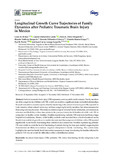Longitudinal growth curve trajectories of family dynamics after pediatric traumatic brain injury in Mexico
Fecha
2020Autor
Versión
Acceso abierto / Sarbide irekia
Tipo
Artículo / Artikulua
Versión
Versión publicada / Argitaratu den bertsioa
Impacto
|
|
10.3390/ijerph17228508
Resumen
Pediatric traumatic brain injury (TBI) represents a serious public health concern. Family members are often caregivers for children with TBI, which can result in a significant strain on familial relationships. Research is needed to examine aspects of family functioning in the context of recovery post-TBI, especially in Latin America, where cultural norms may reinforce caregiving by family members ...
[++]
Pediatric traumatic brain injury (TBI) represents a serious public health concern. Family members are often caregivers for children with TBI, which can result in a significant strain on familial relationships. Research is needed to examine aspects of family functioning in the context of recovery post-TBI, especially in Latin America, where cultural norms may reinforce caregiving by family members, but where resources for these caregivers may be scarce. This study examined caregiver-reported family satisfaction, communication, cohesion, and flexibility at three time points in the year post-injury for 46 families of a child with TBI in comparison to healthy control families. Families experiencing pediatric TBI were recruited from a large hospital in Guadalajara, Mexico, while healthy controls were recruited from a local educational center. Results from multilevel growth curve models demonstrated that caregivers of children with a TBI reported significantly worse family functioning than controls at each assessment. Families experiencing pediatric TBI were unable to attain the level of functioning of controls during the time span studied, suggesting that these families are likely to experience long-term disruptions in family functioning. The current study highlights the need for family-level intervention programs to target functioning for families affected by pediatric TBI who are at risk for difficulties within a rehabilitation context. [--]
Materias
Family caregivers,
Family functioning,
Latin America,
Pediatric TBI,
Traumatic brain injury (TBI)
Editor
MDPI
Publicado en
International Journal of Environmental Research and Public Health, 2020, 17(22), 8508
Departamento
Universidad Pública de Navarra. Departamento de Ciencias de la Salud /
Nafarroako Unibertsitate Publikoa. Osasun Zientziak Saila
Versión del editor
Entidades Financiadoras
This study was supported by the Department of Veterans Affairs Office of Academic Affiliations Advanced Fellowship Program in Mental Illness Research and Treatment, the Medical Research Service of the Veterans Affairs Central Virginia Health Care System, and the Department of Veterans Affairs Mid-Atlantic Mental Illness Research, Education, and Clinical Center (MIRECC). Ramos-Usuga, D. was supported by a predoctoral fellowship from the Basque Government (PRE_2019_1_0164).






